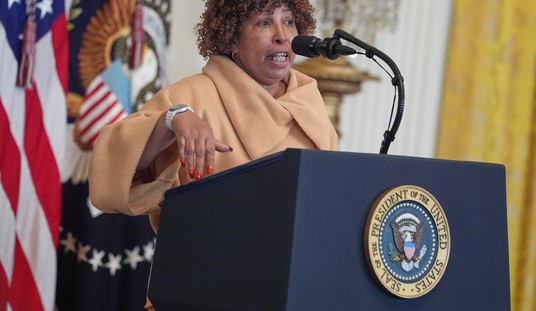
Army Lieutenant Colonel Alexander Vindman, a military officer at the National Security Council, center, arrives on Capitol Hill in Washington, Tuesday, Oct. 29, 2019, to appear before a House Committee on Foreign Affairs, Permanent Select Committee on Intelligence, and Committee on Oversight and Reform joint interview with the transcript to be part of the impeachment inquiry into President Donald Trump. (AP Photo/Manuel Balce Ceneta)
Putting aside the nonsense underpinning Adam Schiff’s impeachment clown show, what has finally been dragged out into the open is the open warfare that exists between President Trump and the permanent bureaucracy. Now, as it has been for the past three years, the locus of that war is the National Security Council. It is the NSC that has, ever since Trump entered office, been the source of leaks calculated to demean and discredit him. It is the NSC that leaked the phone call between President Trump and Ukraine President Zelensky (LTC Vindman is probably patting himself on his fat, meaty back at the thought of this) and supplied a context that is singularly missing from either the transcript or the actions of the US or Ukraine that enabled a “whistleblower” complaint to be contrived.
President Trump has appointed a new National Security Advisor and his first action has been to announce a radical cut in the number of NSC. This has caused howls of dismay.
The changes at the National Security Council are both sweeping and minute: several dozen policy roles will be eliminated as staffers return to their home agencies or leave government in the coming two months; at least two NSC divisions are being phased out completely; a third, meanwhile, has been handed off to a separate White House-based group.
Trump aides insist that shrinking the NSC has nothing to do with impeachment, despite concerns on the left that Trump is trying to root out potential leakers and whistleblowers. Rather, the officials say, it’s about improving efficiency in government and a response to long-standing Republican concerns about the growth of the NSC.
But whether a smaller, O’Brien-led NSC will have more influence on the president is far from clear. Trump has long chosen his gut instinct over policy advice. And NSC staffers fear the impeachment process, which focuses on whether Trump tried to pressure Ukraine to investigate a political rival, will make the president even less trusting of the U.S. bureaucracy than before.
Several NSC officials have already given damning testimony before House committees, and the whistleblower who first flagged the president’s phone call with Ukraine’s Volodymyr Zelensky is reported to be a CIA employee previously detailed to the NSC staff. President Trump has likened the whistleblower, and the officials who spoke with him, to spies.
…
One concern is that de-emphasizing functional directorates could lead to different U.S. policies for different regions of the world. And because U.S. officials who deal with regions are highly invested in maintaining relationships with other governments, there’s also a concern they will de-emphasize issues such as human rights or ending corruption.“The U.S. should, for example, have one approach to democracy and governance globally, not different ones regionally,” one NSC staffer said.
John Gans, author of “White House Warriors,” a book about the NSC and its history, added that other governments may find it disconcerting if in the long run the U.S. doesn’t take the lead on issues that cross national boundaries.
“The transnational stuff — a pandemic, financial crises, climate change — will also still happen but the White House will be less equipped to handle,” he said.
There are several points here.
It is a poorly kept secret that the National Security Council is ineffective. It doesn’t have to be that way but the organization chose to make itself superfluous by its rank disloyalty to the President it exists to serve. Unlike the Defense Department and State Department that have their own legendary bureaucracies and are very touchy and jealous of their institutional prerogatives (“equities,” I believe is the name these folks now give to their own parochial interests), the NSC is part of the Executive Office of the President. Its sole function is to assist the president in developing national security policy and then helping him to carry it out. It is only functional to the extent that it is trusted by the President. If the President can’t count upon his personal staff to carry out his policy preferences, then he’s hamstrung. And that has been the case since Day One:
Then-White House Chief of Staff Reince Priebus in 2017 became convinced that NSC detailees were leaking, sometimes inaccurately, details of Mr. Trump’s meetings and phone calls with foreign leaders. But he could never find the culprits, a former aide said.
The aide said some of the NSC detailees who arrived that year had bashed the president on social media.
J.D. Gordon, the Trump campaign’s director of national security and a former Pentagon spokesman, is one of those who were shunned by the new administration. He got caught up in the Trump-Russia probe but was never accused of wrongdoing.
“Trump set his own whistleblower and investigation traps by allowing his campaign staff and surrogates to be near-universally kept out of [the] administration while letting Obama holdovers stay and hiring people who didn’t support him or MAGA policies in general,” Mr. Gordon told The Times.
The NSC might possibly have some solid performers…and you could probably put their names on a 3×5 card. The manning system in the NSC is based on borrowing staff from other agencies. It seems to attract psychopaths and zealots because of the access to power and the ability, as a mid-grade military officer or civil servant, to tell senior officials what to do and to feel like you’re steering the foreign policy of the United States. Very often, it seems, these people forget what their real job is and assume that they are the policymaker. As Mike Ford noted in his Interagency Consensus: Another Term For: Deep State (head’s up, this is a VIP link):
“…harmful to U.S, government policy.” Where does this young officer get off?! Doesn’t he know that according to Article II of the U.S. Constitution, that it is The President of these United States who determines foreign policy? Doesn’t he know from his attendance at the Army’s Command and General Staff Officer Course that he is a staff officer? Doesn’t he know that his role is merely advisory? Apparently not.
Giving him a huge benefit of the doubt, I believe at some time in the past, he possibly did. But like many in the deep state, those who were once apolitical, he has become enamored of his own abilities and his own place in the government universe. I believe these folks truly believe that they, not the elected officials who happen to pass through every four years, should be determining the course of U.S. foreign Policy and Intelligence. They, after all, are ever so much more qualified to decide such things…at least that is what’s apparent from Vindman’s testimony.
Moreover, when the president starts to see the NSC as his enemy (and here he is correct), then he will inevitably develop backchannel methods of carrying out his foreign policy that can result in unfortunate things happening.
And it isn’t like the system attracts the best or brightest. As far as I can tell, Vindman’s sole qualification for the position was that he is (allegedly) a native Russian and Ukrainian speaker and apparently couldn’t hack it as an infantry officer so he bailed out and chose to be a foreign area officer. Why do I say this?
Top Ukraine guy at NSC apparently thought Obama administration had provided Javelins to Ukraine. pic.twitter.com/Gd1830At3K
— Byron York (@ByronYork) November 9, 2019
No. Not true. The first sale of Javelins to Ukraine was approved in December 2017. If this guy can’t get such a basic and highly publicized date correct, what else is he f***ing up? My guess is “a lot.”
Much as Rush Limbaugh said that feminism was just a way of giving really ugly women an entree into polite society, a lot of the foreign policy bureaucracy is just a way of giving underachieving megalomaniacs much more power than they deserve to wield.
Shortly before Trump was inaugurated, the professor chairing the National Security Affairs chair at the National Defense University wrote a short monograph on the NSC and how it should be organized. This is the key part.
More often than not (although there are occasional exceptions), hiring young, inexperienced, unseasoned NSC staffers—even with impressive academic credentials or connections to prominent figures—will backfire. Excessive ambition, personal agendas, and divided loyalties can only distract and disrupt complex and highly sensitive NSC machinery. The NSC staff is a place for grownups, committed to serve the Nation and the President. Only careful vetting and objective criteria will ensure an NSC staff that is up to the task.
…
It is no place for oversized egos, partisan bomb throwers, ambitious juniors, overbearing seniors, or policy “tourists” who lack the interest and persistence to work key issues across months and even years. Here, competence, character, collegiality, and selfless service are the keys to the kingdom.
The National Security Council doesn’t need restructuring or downsizing. It needs an absolute and total purge. It needs to be a professional organization that knows it doesn’t make policy but loyally carries out the foreign policy direction articulated by the President and if they can’t do that, they need to have the huevos to say “I’m outta here.” Until that happens, the President would be an idiot to entrust the NSC with anything more substantial than picking up lunch orders.













Join the conversation as a VIP Member